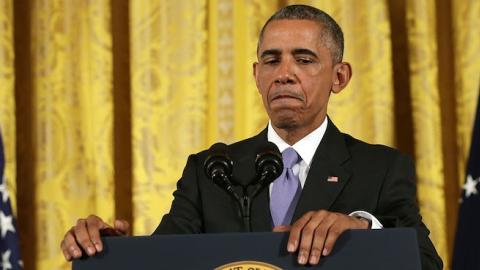In an interview last week for his new book The Iran Wars, Jay Solomon of the Wall Street Journal told Andrea Mitchell that Iran in 2013 had threatened to pull out of nuclear talks if the United States hit Bashar al-Assad’s forces over the Syrian dictator's use of chemical weapons. The Obama administration quickly denied this. "Not true," tweeted White House aide Ned Price.
Of course it's true. And if it weren't, Barack Obama would have a lot of explaining to do. Why else did he allow Assad to violate Obama's own "red line" with impunity? Why did he jeopardize American interests and endanger allies throughout the Middle East? Why else did he allow a refugee crisis to destabilize Europe? Why has he done nothing to stop the slaughter of nearly half a million Syrians?
Obama himself publicly acknowledged that he won't interfere with Iranian interests in Syria. In a December 2015 White House press conference, the president spoke of respecting Iranian "equities" in the Levant. That means preservation of the Assad regime, a vital Iranian interest since it serves as a supply line for Iranian weapons earmarked for Hezbollah in Lebanon. The White House was so serious about respecting this particular "equity" that it repeatedly leaked details of Israeli strikes on Iranian arms convoys. Obama wanted to show the Iranians his bona fides as a negotiating partner.
A nuclear deal with Iran has been Obama's foreign policy priority since he first sat in the Oval Office. The agreement would pave the way for a broader realignment in the Middle East—downgrading traditional American allies like Israel and Saudi Arabia and upgrading Iran—and thus allow the United States to minimize its footprint in the region. With so much at stake, including his hunger for a personal legacy, Obama didn't dare risk alienating Iran by targeting Assad.
The real deal that Obama made with the mullahs has been clear for some time now: They got to keep their client in Syria, and Obama got his "historic" achievement. So why not just spin the press and claim that laying off Assad was part of the price America paid for Obama's stunning diplomatic triumph? Indeed, last we heard from Ned Price, the White House aide was bragging to the New York Times Magazine about manipulating the media. "The easiest way for the White House to shape the news," Price explained,
is from the briefing podiums, each of which has its own dedicated press corps. "But then there are sort of these force multipliers," he said, adding, "We have our compadres, I will reach out to a couple people, and you know I wouldn't want to name them—" . . . "And the next thing I know, lots of these guys are in the dot-com publishing space, and have huge Twitter followings, and they'll be putting this message out on their own."
So why won't the administration just tap its "compadres" now and get the message out? Because of Omran Daqneesh. He's the 5-year-old Syrian boy whose bloodied and shell-shocked visage was splashed across the international media last week. He was pulled out of the rubble left by a Syrian or Russian bombing run, and then sat in an ambulance in a nearly catatonic state as photographers snapped his picture. Omran instantly embodied the senseless waste of a five-and-a-half-year war that has taken nearly half a million lives, including thousands of children just like Omran. "The babies are dying in Aleppo," wrote the New Yorker's Robin Wright.
Sure—they're dying. But who is responsible? Wright left that part out. Yes, the Islamic State has killed lots of people in Syria. Reports last week, however, showed that Russia has killed more civilians than ISIS, which doesn't use planes to kill. Either the Assad regime or its Russian allies are dropping bombs that kill babies so as to prop up Iran's ally, the one Obama left alone to seal his deal with Tehran.
And that's why, in this one instance, the White House has been loath to reach out to its compadres and preen about the tough real-world choices Obama made to get his nuclear deal with Iran. Because those choices were gruesome, and they undercut the image of the 2009 Nobel Peace Prize recipient as a man of reason, wisdom, courage, and compassion—an image the press coauthored.
In the narrative preferred by the administration and its media compadres, Obama heroically defied a gauntlet of warmongering Republicans who were akin to the hardliners of the Islamic Revolutionary Guard Corps in their opposition to the nuclear deal. The image of a 5-year-old Syrian boy covered in the rubble left by the IRGC and its allies points to an altogether different kinship. The regime Obama accommodated is party to the slaughter of infants. The only technique the White House has at its disposal in this case is to lie and deny the facts.
No one who used a position in the press to help sell the Iran deal wants to look very closely at the consequences. But these are the facts. Obama's national security staff advised, almost unanimously, backing the anti-Assad rebels. Obama rejected their counsel. And he did so not out of a judicious desire to keep America out of another Middle East conflict but to make nice with Tehran. He supported the side waging a campaign of sectarian cleansing. The administration shared intelligence with units of the Lebanese Army controlled by Hezbollah. It forced Syrian rebel groups that the United States had trained and armed to sign documents promising they wouldn't attack Assad, the despot ordering the torture and murder of their families and friends. In this way, Obama protected the man who bombs 5-year-olds.
Most tellingly, Obama gave Iran billions of dollars in sanctions relief. The policy could have been to not return the money until Iran withdrew all forces from Syria and support for Assad. Obama could have said, __I don't care if only one American penny from these billions is used to save Assad's scalp, we won't be complicit in the murder of innocents. Iran gets no sanctions relief until they are out of Syria__. But he didn't. No, the White House talking points hold that the tens of billions in sanctions relief, as well as the $1.7 billion in ransom money paid in exchange for American hostages, was all Iran's money to begin with. Money to do with as it wishes.
The price Obama paid to ink an agreement with Iran continues to mount. What's certain is that to get that agreement, Obama made his peace with Assad ruling over Syria and prosecuting a war that has claimed half a million lives so far. For the White House and its surrogates in the media, the moral reckoning for that deal is still to come.
















